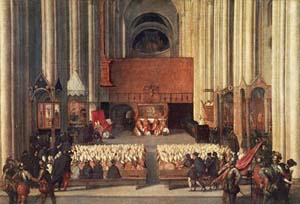Although there have been 21 “ecumenical councils” convened so far in the church’s history, Trent (the 19th) has the rest beat in many ways. For one thing, it lasted the longest, from 1545-1563. It crossed the reigns of five popes, including Paul III, Julius III, Marcellus II, Paul IV, and Pius IV, and two emperors (Charles V and Ferdinand). This council comprised 25 sessions and issued more reforms and dogmatic degrees than any prior, setting the church on its course for the next 400 years.
An ecumenical council usually involves assembling bishops and others who represent the entire church from all over the world, so it’s not undertaken lightly or frequently. While two such councils have followed in the wake of Trent, Vatican I (1869-1870) lasted less than a year and was never formally finished due to the outbreak of war. The more well-known Vatican II (1962-1965) is the only council since Trent to have a significant impact on the direction of the church.
 |
| A SESSION of the Council of Trent. |
But the council was also good for drama: a great historical mess of a convocation, adjourned several times due to turmoil from within and without. Paul III convened it, hoping to respond to Luther’s reforms in a matter of months. He made the greatest progress of the entire 18 years in the first two years by affirming the “equal reverence” of scripture and tradition—contrary to Luther’s insistence on scripture alone—and producing the response to Lutheran teaching on “justification by faith.” Paul III also oversaw teachings on the efficacious nature of sacraments and the affirmation of seven of them—contrasted with the Lutheran adherence to two. The rest of the agenda was left to his successors.
Julius III made his contribution in affirming other teachings on the sacraments, especially the Real Presence of Christ in the Eucharist, opposing the purely symbolic approach of the reformers Zwingli and Calvin. Marcellus II showed great promise but died 20 days after assuming the office. Paul IV had no interest in continuing the council at all, holding what have since been called “unrealistic” views of papal authority; it was he who first issued the Index of Forbidden Books—so extensive it shocked even his supporters. Pius IV reconvened Trent in the face of new threats from Calvinism. He defined the nature of ordination’s indelible character and the sacramentality of marriage and brought the council successfully to a close. In the face of a sea change in the Christian world, the Catholic self-understanding had been expressed in ways that would prove enduring.
Scripture
• Predecessor to the councils: Acts 15, the “Council of Jerusalem”
Online
• Texts of the documents of the Council of Trent
Books
• The General Councils: A History of the Twenty-One Church Councils from Nicaea to Vatican II by Christopher M. Bellitto (Paulist Press, 2002)
• The Ecumenical Councils of the Catholic Church: A History by Joseph F. Kelley (Liturgical Press, 2009)
Ask Alice a question.

More questions...and responses
What are the “Precepts of the Church”?
Do Catholics take the biblical creation story literally?
Why can’t a woman be ordained?
Is Purgatory still “on the books”?
Why is it important to participate regularly in the Mass?
Why can people go to Mass on Saturday evening instead of Sunday?
Did King David compose the psalms?
Who were Jesus' “brothers and sisters”?
Is there really a Catholic Index of Forbidden Books?
What are the corporal and spiritual works of mercy?
What’s the difference between celibacy and chastity?
Is it “Catholic” to be vegetarian? Do Catholics care about animal suffering?
What does the Bible say about Judgment Day?
Why do Christians believe Jesus is God incarnate?
What’s that picture of Jesus with rays flowing from him?
Who chose the "Seven Deadly Sins"?
"What should I believe about hell?"
Is the Mass a “holy sacrifice” or a “celebration”—or both?
Pulpit, lectern, ambo: What’s the difference?
What is “discernment of spirits”?
Is environmentalism “Catholic” or a political football?
Why do Catholics believe in the Immaculate Conception?
Do Catholics believe in ghosts?
What is the Liturgy of the Hours?
How does God “answer” prayers?
What does “salvation history” mean?
Why do Catholics believe in the Assumption of Mary?
Why do priests wear vestments?
What is Catholic decision-making?
How does the Catholic Church view other religions?
What's the difference between chapels, churches, cathedrals, and basilicas?
Where do the Stations of the Cross come from?
What's the relationship between the Old Testament and the New Testament?
When and where is it appropriate to bow inside Catholic churches?
Can I come back to the church?
Why does the priest talk after the readings at Mass?
What's the difference between catechesis and evangelization?
Didn't Saint Paul write all the letters attributed to him?
Are we supposed to believe in angels and demons in the 21st century?
Who are the saints and why do we pray to them?
Who are the "Doctors of the Church"?
How were the books of the Bible chosen?
What's the difference between saying "set" prayers and prayers in my own words?
What do Catholics have to believe?
Who were the prophets? Does God still call people to prophecy?
Why do Catholics bless themselves, genuflect, and so on?
What do we mean by the church’s “magisterium”?
Is there salvation outside the Catholic Church?
What do people in religious life do for fun?
Why is celibacy important to religious life?
Vocation: For all of life, or only "religious life"?
Is my vocation from God or just my imagination?
What does the Bible say about discipleship?
How do I know whether be an order priest or a diocesan priest?
What do Catholics believe about scripture and tradition?
"Sin" is such a negative word. Can't we just talk about “failure”?

